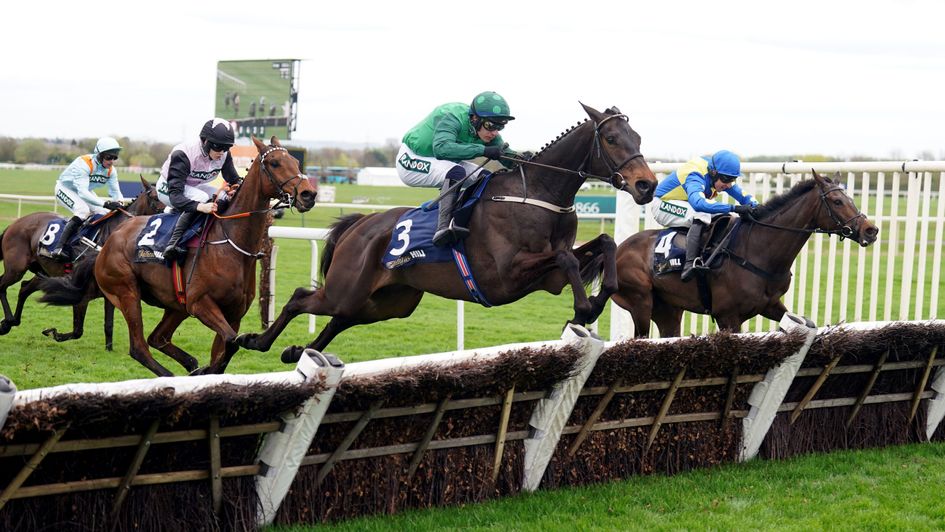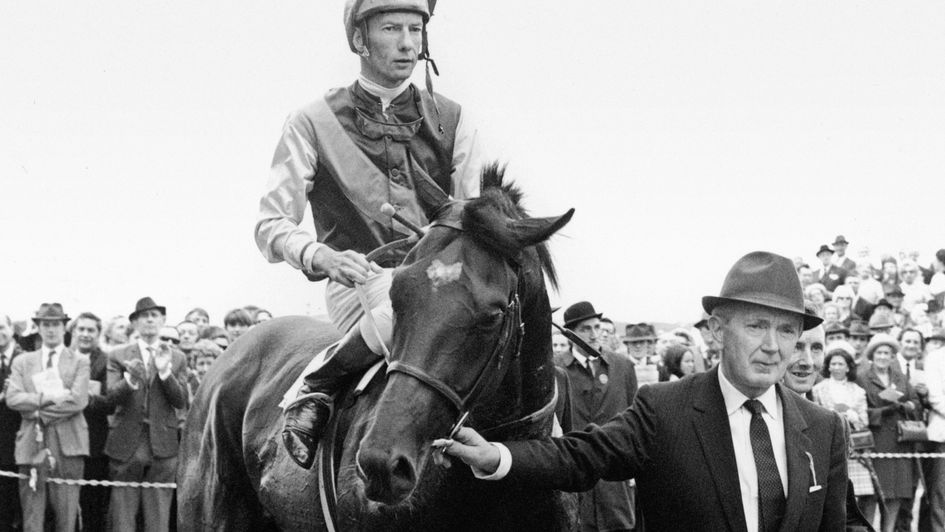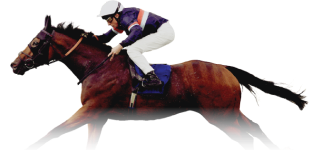With Willie Mullins close to becoming champion jumps trainer in Britain, John Ingles looks at how Vincent O'Brien achieved that feat in the 1950s and how Mullins went close to joining him eight years ago.
In a career that spanned more than 50 years before his retirement in 1994, Vincent O’Brien’s exploits as a Flat trainer included winning all the English and Irish classics at least once (the Derby six times), the Prix de l’Arc de Triomphe three times and, towards the end of his career, a memorable Breeders’ Cup Mile with Royal Academy ridden by Lester Piggott who’d partnered so many of his best horses in the past. O’Brien was also twice champion Flat trainer in Britain (in 1966 and 1977) but achievements such as those have tended to overshadow his earlier success as a trainer of jumpers.
Indeed, what prompted O’Brien’s switch to training exclusively on the Flat was that, when still only in his early 40s, he had already won everything worth winning over jumps. Cottage Rake won three successive Cheltenham Gold Cups (1948-1950), an achievement which overlapped with stablemate Hatton’s Grace completing a similar hat-trick in the Champion Hurdle (1949-1951). In all, O’Brien won 23 races at the Cheltenham Festival by the time he ceased training jumpers at the end of the 1950s.
Not the least of O’Brien’s exploits as a trainer of jumpers was the unique feat of winning the Grand National in successive years during that decade with three different horses; Early Mist (1953), Royal Tan (1954) and Quare Times (1955). In those days the Grand National might have been worth only a fraction of the half a million pounds which I Am Maximus earned from winning this year’s race, but then, as now, it was much the biggest prize in the British jumps season, worth nearly three times as much as the Gold Cup.
That meant that winning the Grand National was every bit as crucial to O’Brien becoming champion jumps trainer in Britain in the 1952/53 and 1953/54 seasons as it looks likely to be for Willie Mullins this season, 70 years after an Irish trainer last achieved that feat.
Besides the Grand National, among the dozen Grade One races that Mullins has won in Britain this season is the Cheltenham Gold Cup, and O’Brien too won both the Gold Cup and Grand National in the first season that he was champion in Britain. Three weeks before Early Mist’s 20-length victory at Aintree, Knock Hard had given O’Brien a fourth success in the Gold Cup to go with the three won by Cottage Rake.
Knock Hard also won what was then another of the season’s most valuable chases, the Great Yorkshire Handicap at Doncaster, which meant that O’Brien was champion trainer having trained five winners in Britain with total winnings (place money didn’t count in those days) of £15,515. Runner-up was Captain Ryan Price whose earnings of £15,359 came from a total of 78 wins!
Knock Hard was only fifth of six finishers in the 1954 Gold Cup but with the 1951 Grand National runner-up Royal Tan successfully replacing the injured Early Mist at Aintree that year, that helped O’Brien win his second successive trainers’ title in Britain. Royal Tan was one of four winners for the stable at the Aintree Spring meeting that year from just seven races over jumps at what was then a mixed Flat and jumps fixture. Also helping O’Brien to win his second title in Britain were three winners at Cheltenham, including the following season’s Grand National winner Quare Times in the National Hunt Chase.
But the days are long gone when an Irish jumps trainer could become champion in Britain ‘just’ by winning a handful of the biggest prizes. Proof of that came as recently as the 2020/21 season when Henry de Bromhead not only won the Grand National, Gold Cup and Champion Hurdle, as Mullins did this year, but also the Champion Chase. De Bromhead’s eight wins in Britain that season contributed to prize money of more than £1.5m but that still left him well short of champion Paul Nicholls who earned nearly £2.5m helped by his best-ever seasonal total of 176 wins.

Mullins’ lead in the British championship going into the final week of the current season has therefore been the result of not just another outstanding Cheltenham Festival and a Grand National victory, but also launching a bigger raid than usual on the rest of Aintree’s meeting, which yielded four Grade One wins thanks to Il Etait Temps, Impaire Et Passe, Mystical Power and Dancing City, and then sending a large team to Ayr on Saturday which resulted in a four-timer, including Macdermott landing the six-figure prize that goes with winning the Scottish Grand National. Those wins at Ayr immediately restored Mullins’ lead in the championship which he’d briefly lost after Dan Skelton had landed a treble at the same track the day before which put him narrowly in front.
With a strong team being assembled for Sandown’s rich Jump Finale card on Saturday, Mullins is leaving nothing to chance in his bid to become Ireland’s first champion jumps trainer in Britain since Vincent O’Brien. He is no doubt mindful of being in a similar position at the end of the 2015/16 season when locked in a battle with Paul Nicholls which went down to the final day.
Nicholls used his Betfair blog that season to announce on April 1st – the date was significant – that the stables of his former assistants Dan Skelton and Harry Fry would become satellite yards of their former boss for the remainder of the season and their horses would run in his name to boost his challenge for the trainers’ championship which looked to be slipping away from him at the time!
Ironically, it was a four-timer at Ayr on Scottish Grand National day, that included Vicente winning the big race, which swung the balance back in Nicholls’ favour. Mullins’ Scottish National runner Measureofmydreams was an early faller, while he picked up a couple of third places from his three other runners on the card. The odds about Nicholls winning his tenth championship had been 5/1 at the start of the day but he was 5/6 after those four winners at Ayr and shorter still after another four-timer at Wincanton the next day.
Nicholls had won only two Grade 1 races that season thanks to Adrien du Pont in the Finale Juvenile Hurdle at Chepstow and Silviniaco Conti in the Ascot Chase. Mullins, on the other hand, who won 27 races in Britain that season (compared with Nicholls’ total of 122), won 13 Grade 1 contests – one more than this season. Six of those Grade 1 wins had come at the Cheltenham Festival, notably the Champion Hurdle won by Annie Power. Like this season, Mullins concentrated more firepower than usual at Aintree where he had six winners in total, including Grade 1 victories for Apple’s Jade, Douvan, Yorkhill and Annie Power again in the Aintree Hurdle. Incidentally, Annie Power’s son Mystical Power, a Grade 1 winner at Aintree himself this month, has done his bit too for his stable’s current championship bid.
All four of Mullins’ Grand National runners failed to complete, while there was no joy either for any of Nicholls’ six runners, Silviniaco Conti included. But it was the fall of the normally superb jumper Vautour, sent off at 1/5 for the Melling Chase (worth £112,260 to the winner), which in hindsight cost Mullins what would have been a first British title in 2015/16.
With all to play for at Sandown on the final day of the season both trainers drew a blank in the first three races, though frustratingly for Mullins he had the runner-up in all three contests. Voix du Reve and Valseur Lido were beaten favourites in their races, while 5/4-shot Un de Sceaux was no match for 11/10 favourite Sprinter Sacre in the Celebration Chase. The decisive blow, however, came in the most valuable contest on the card, the bet365 Gold Cup, in which Nicholls’ two runners Just A Par (beaten a short head) and fourth-placed Southfield Theatre picked up enough prize money to put the title out of Mullins’ reach.
Since 1994, the BHA and the National Trainers’ Federation have recognised championships decided by total earnings as determined by the Racing Post. That gave Nicholls the verdict over Mulllins by £2,439,560 to £2,341,735. However, the statistics which appeared at the front of Timeform’s Chasers & Hurdlers annual were based on one-two-three earnings only, and by that measure Mullins would have had the upper hand with £2,271,652 to Nicholls’ £2,248,607.
Even eight years ago, Timeform made the claim in Vautour’s essay in Chasers & Hurdlers that season that ‘for its sheer scale, strength in depth and influence, the Closutton yard in County Carlow run by Willie Mullins is without precedent.’ With Mullins on the verge of becoming the first Irish jumps trainer for 70 years, since the great Vincent O’Brien, to become champion in Britain, and in a season when he trained his 100th Cheltenham Festival winner and has already broken his own record for the most winners in an Irish jumps season, the same statement rings truer now than ever.
More from Sporting Life
- Racecards
- Fast results
- Full results and free video replays
- Horse racing news
- Horse racing tips
- Horse racing features
- Download our free iOS and Android app
- Football and other sports tips
- Podcasts and video content
Safer gambling
We are committed in our support of safer gambling. Recommended bets are advised to over-18s and we strongly encourage readers to wager only what they can afford to lose.
If you are concerned about your gambling, please call the National Gambling Helpline / GamCare on 0808 8020 133.
Further support and information can be found at begambleaware.org and gamblingtherapy.org.










